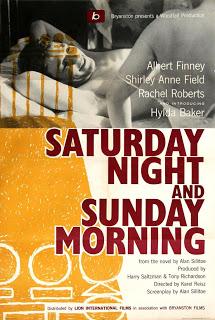
Directed By: Karel Reisz
Starring: Albert Finney, Shirley Anne Field, Rachel Roberts
Tag line: "Saturday night you have your fling at life...and Sunday morning you face up to it!"
Trivia: Albert Finney learned to use a lathe during filming
Right around the time that Francois Truffaut and Jean-Luc Godard were shaking things up in France, the UK film industry was experiencing a “New Wave” of its own. Taking a page from their French counterparts, filmmakers like Tony Richardson, Lindsey Anderson, and a handful of others (many of whom were already movie critics and documentarians) put the focus squarely on working class Britain, a group that had been roundly ignored up to that point. Released in 1960, Saturday Night and Sunday Morning stands as a shining example of the British New Wave movement, and is the film that introduced audiences to a 23-year-old actor by the name of Albert Finney.
Arthur Seaton (Finney) spends his weekdays working as a machinist in a dingy Nottingham factory, and his weekends living life to its fullest. Come Saturday, you’ll usually find him getting drunk at the local pub or fishing in a nearby stream with his cousin Bert (Norman Rossington). If not, then you can be sure Arthur is out and about with Brenda (Rachel Roberts), a married woman he’s been seeing for some time. The whole situation is a bit dicey; Brenda’s husband, Jack (Bryan Pringle), is a co-worker of Arthur’s, and the two lovers must go to great lengths to ensure that their illicit affair remains a secret.
Then, at a pub one afternoon, fate throws a monkey wrench into the works when Arthur meets the beautiful Doreen (Shirley Anne Field), with whom he falls instantly in love. As if that’s not enough, Brenda drops a bombshell that threatens to tear his world apart: she’s pregnant with Arthur’s child! Hoping to avoid a scandal, Brenda decides abortion is her best option, and Arthur promises to help her out any way he can. But will his continued involvement with Brenda destroy any future he might have with Doreen?
Like many films of the British New Wave, Saturday Night and Sunday Morning boasts an almost documentary-like feel; director Karel Reisz shot the majority of the movie in and around Nottingham (the very first scene is set inside the factory where Arthur works, while the opening credits play over images of him riding his bike through the streets). By relying on actual locations as opposed to a studio soundstage, Reisz infused the film with a gritty realism that, from start to finish, enhanced its blue-collar mentality.
Saturday Night and Sunday Morning also made Albert Finney a star, and the actor did his part to make the role of Arthur Seaton a memorable one. “What I’m out for is a good time” Arthur says during the opening narration, and this is how he approaches life throughout the entire film. He drinks heavily, stands up to the older generation (his nosy neighbor Mrs. Bull, played by Edna Morris, is a regular target of his aggression), and has no qualms about being seen in public with a married woman (Arthur genuinely cares for Brenda, yet we get the feeling it’s the dangerous nature of their relationship that really appeals to him). Though he’s clearly an angry young man, we nonetheless identify with Arthur’s desire to break free of the monotony of his working-class existence, and Finney’s lively, heartfelt performance is the reason why.
Upon its release, the BBFC saddled Saturday Night and Sunday Morning with an “X” rating, due mostly to the film’s unapologetic depiction of abortion and extramarital sex. The movie-going public, however, saw things differently; Saturday Night and Sunday Morning was a box-office hit, proving beyond a shadow of a doubt that, like their compatriots in France, UK audiences were ready for a change.
And thanks to Karel Reisz and his pals, a change is exactly what they got.
